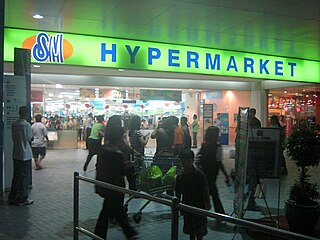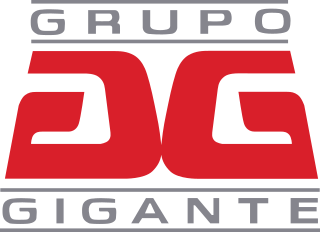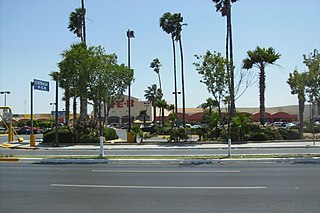
Walmart de México y Centroamérica, also known as Walmex, is the Mexican and Central American Walmart division. Walmart de México y Centroamérica is Walmart's largest division outside the U.S. as of October 31, 2022, consists of 2,804 stores around the country, including 300 Walmart Supercenter stores and 167 Sam's Club stores. It has been traded in the Mexican Stock Exchange since 1977. Walmart de México y Centroamérica is the biggest retailer in Latin America.

A hypermarket is a big-box store combining a supermarket and a department store. The result is an expansive retail facility carrying a wide range of products under one roof, including full grocery lines and general merchandise. In theory, hypermarkets allow customers to satisfy all their routine shopping needs in one trip. The term hypermarket was coined in 1968 by French trade expert Jacques Pictet.

Supermercados Gigante was a large supermarket chain in Mexico. The chain expanded north of the border as well, as it also had locations in predominantly working-class Mexican-American communities of the United States.
A discount store or discounter offers a retail format in which products are sold at prices that are in principle lower than an actual or supposed "full retail price". Discounters rely on bulk purchasing and efficient distribution to keep down costs.
Tiendas Comercial Mexicana S.A. de C.V., colloquially known as La Comercial and La Comer, was a Mexican hypermarket group that operated mainly in Mexico City and Central Mexico. It was founded in 1930 and operated by Controladora Comercial Mexicana. From 2016 to 2018 it was owned and operated by Soriana, which also owns Alprecio stores. Comercial Mexicana, including its different store formats, was the third-largest supermarket chain in Mexico as of 2014.

Auchan is a French multinational retail group headquartered in Croix, France. It was founded in 1961 by Gérard Mulliez and is owned by the Mulliez family, who has 95% stake in the company. With 354,851 employees, of which 261,000 have 5% stake in the company, it is the 35th largest employer in the world.
Organización Soriana is a Mexican public company and a major retailer in Mexico with more than 824 stores. Soriana is a grocery and department store retail chain headquartered in Monterrey, Nuevo Leon, Mexico. The company is 100% capitalized in Mexico and has been publicly traded on the Mexican stock exchange, since 1987 under the symbol: "Soriana".

Chedraui is a publicly traded Mexican grocery store and department store chain which also operates stores in the U.S. in the states of California, Arizona, New Mexico, Texas, and Nevada under the banner name El Super and stores in Texas under the banner name Fiesta Mart. It is traded on the Mexican Stock Exchange under the symbol CHEDRAUI.

Casa Ley is a Mexican grocery store chain based in Culiacán founded in 1954 by Juan Ley Fong. Most of its stores are located in western Mexico, in the states of Baja California, Sonora, Sinaloa, Nayarit, Jalisco, Colima, Coahuila, Durango, Guanajuato, and Baja California Sur. It is Mexico's largest privately held supermarket chain. For years, 49% of the chain was owned by American supermarket chain Safeway Inc., which later went to Albertsons Companies, Inc. after it acquired Safeway in 2015. In 2018, Albertsons divested its 49% share to Tenedora CL del Noroeste, ending the company's international operations.

Clubes City Club is the wholesale club of Mexican grocery store Soriana founded in 2002, in this same year it opened the first club in Torreón, Coahuila, Mexico, in Fundadores Square, that also has a Soriana store. As of 2023 it has 39 stores.

Hipermart is a Mexican hypermarket (supermarket) chain owned by the Soriana Organization. The chain opened its first stores in 1989. Later, the company opened new stores in Tecnológico in Chihuahua, Independencia and Oriente in Torreón, and Santa María in Monterrey. In 1995, the company was bought out by the Martin families from Torreón and Monterrey, who merged it into Soriana. Almost all the Hipermart stores have been renamed Soriana; only Independencia still operates under the original name.

Grupo Gigante is a holding listed at Mexican Stock Exchange founded in 1962, enterprises includes: Office Depot, The Home Store, SuperPrecio and Toks. The namesake hypermarkets and supermarkets are sold in 2008 to Soriana. Until December 2008, used to work with a joint venture with RadioShack.

Supermercados Internacionales HEB, S.A. de C.V. is the Mexican division of H-E-B, a private supermarket chain based in San Antonio, Texas, U.S. It competes mainly with Soriana, Walmart México, Bodega Aurrerá, S-Mart, Chedraui and Casa Ley.

La Cinco y Diez, is the name of an intersection, pedestrian overpass over that intersection, public transportation hub and major retail district in La Mesa borough, Tijuana, Mexico. The name exists because a branch of the Luján/Cardenas family's "La Cinco y Diez" five and dime store once stood here, and Tijuana residents taking taxis or buses would ask to be let off by "La Cinco y Diez".
City Market in Mexico is a chain of gourmet grocery stores owned by La Comer.
Galerías Perinorte is a 90,000 m2 (970,000 sq ft) shopping center in Cuautitlán Izcalli, State of Mexico, in the northwest part of the Mexico City metropolitan area. The architect was Manuel Rocha Díaz and it was built between 1985 and 1990 and opened in 1992. The main anchors are a Cinépolis multicinema; a Soriana Híper hypermarket and Liverpool and Suburbia department stores. The Perinorte center, as well as Liverpool and Suburbia chains, are all owned by the El Puerto de Liverpool group. Perinorte is part of the Puerto group's shopping center division, Galerías.
Grupo Cifra or Grupo Aurrerá-Cifra was a Mexican company, owned by Jerónimo Arango and his brother Manuel Arango, founded in 1986, whose main component businesses were supermarket chains Aurrerá and Superama, restaurant chains VIPS and El Portón, department storesSuburbia and others such as El Gran Bazar, BONS, Fratti and Bon Savor. The Group ceased to exist in 2000 as it became part of Walmart.













